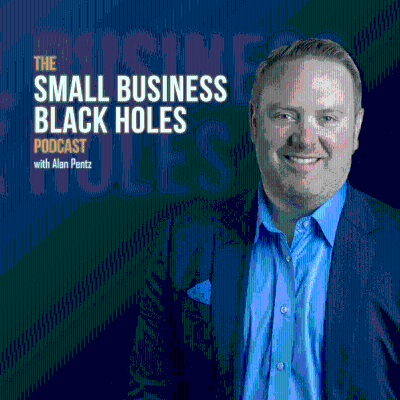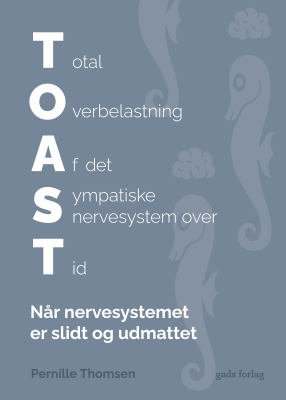
The Small Business Black Holes with Alan Pentz
engelsk
Business
Begrænset tilbud
2 måneder kun 19 kr.
Derefter 99 kr. / månedOpsig når som helst.
- 20 lydbogstimer pr. måned
- Podcasts kun på Podimo
- Gratis podcasts
Læs mere The Small Business Black Holes with Alan Pentz
Welcome to The Small Business Black Holes podcast show with Alan Pentz, where we help you navigate the chaos of today's world with precision. Forget the old playbook - it's toast. We’re in a new game now, and Alan Pentz is here to help you win. Alan brings 25 years of experience working at the highest levels of business and government, from Capitol Hill to advising the federal government on cutting-edge innovation. He’s seen the old rules fall apart and knows what it takes to thrive in this brave new world. Whether it's superpowers battling for dominance or inflation throwing everyone for a loop, Alan helps you play 4D chess while everyone else is stuck on checkers? Let’s dive in.
Alle episoder
85 episoderThe Death of Mediocrity: How AI is Forcing Small Business Evolution | Steve Wilkinson
This intellectually rich episode of Small Business Black Holes examines the fundamental forces reshaping entrepreneurial success in the AI era. Host Alan Pentz engages with Steven Wilkinson—a seasoned investor, linguist-turned-strategist, and keen observer of small business dynamics—to explore why most enterprises struggle while a select few achieve extraordinary results. What You'll Discover: * The Great Performance Divide: Why the top 10% of small businesses capture 65% of industry profits through superior execution in three critical areas: finance, marketing, and laser focus * The Disintermediation Thesis: How AI is systematically eliminating mediocre service providers while creating unprecedented opportunities for high-value specialists who can deliver measurable results * The Three Business Currencies: Understanding how successful enterprises get paid in gross margin, compound knowledge, and reputation—and how these create self-reinforcing flywheels of growth * Strategic vs. Tactical Thinking: Why the "$10,000 hour" mindset—deep strategic reflection followed by focused execution—generates exponentially better results than constant activity * The Cybernetic Advantage: Applying directional steerage principles to business growth, concentrating scarce resources on high-leverage points for maximum chain-reaction effects * Implementation Over Innovation: Why human expertise remains irreplaceable in translating AI-powered insights into consistent business results * The New Professional Model: How the atomization of traditional agencies is creating opportunities for fractional executives who combine specialized knowledge with advanced tools * Building Your Business Peloton: Creating sustainable competitive advantage through disciplined team-building, systematic approaches, and compounding expertise Wilkinson brings rare intellectual depth to practical business challenges, drawing insights from financial market history, cybernetics theory, and decades of observing what separates exceptional performers from the struggling majority. This conversation transcends typical business advice, offering a framework for understanding and navigating the fundamental forces shaping entrepreneurial success. Highlights: [05:46] The Power of Focus in Small Business Performance Alan Pentz reveals that just 10% of small businesses capture 65% of industry profits through superior execution in three critical areas: finance, marketing, and focus. The performance gap is staggering, with top performers achieving 5-7x higher EBIT multiples than average competitors. Small business owners can achieve outsized returns through even modest improvements in competence, particularly in these three fundamental areas. The key is maintaining consistent effort rather than sporadic attempts at improvement, with real results typically taking 6-8 months to materialize. For business owners looking to break through growth plateaus, this insight emphasizes the importance of sustained, focused effort in key areas rather than trying to improve everything at once. [13:00] Building Your Business Peloton Just as Tour de France winners rely on a supporting team, successful businesses need a coordinated group of specialists working together. The shift from solo operation to building a team of experts (CFO, CMO, COO) creates exponential performance improvements through combined expertise and mutual support. Business owners must focus on their core strengths while building this "peloton" of supporters who create momentum through their collective effort. The key is understanding that sustainable growth comes not from individual heroics but from building and coordinating a high-performing team. This approach allows business owners to escape the trap of trying to do everything themselves and achieve breakthrough growth. [35:07] The Strategic Power of Focused Thinking Rather than constant activity, true business success comes from concentrated strategic thinking and deliberate action on carefully chosen priorities. Like Gandhi, who achieved massive change through just three focused campaigns, business owners need to identify and concentrate resources on the most impactful opportunities. This approach requires rejecting the "hustle culture" mindset that values constant activity over strategic thinking and focused execution. Instead of trying to be machines, successful business owners need to make time for deep thinking and strategic planning. The result is exponentially higher returns - potentially $10,000 per hour or more - through better-directed effort rather than endless busy work. [38:13] The Cybernetic Approach to Business Growth Understanding cybernetics - the art of efficient directional steering - provides a framework for achieving compound business growth through targeted action. By deeply understanding customer problems and delivering focused solutions, businesses create a self-reinforcing cycle of increasing margins, knowledge, and reputation. This virtuous cycle generates growing momentum as each success builds upon previous wins, creating exponential rather than linear growth. The key is maintaining focus on specific, high-impact activities rather than diffusing effort across too many initiatives. When properly executed, this approach creates a "chain reaction" of positive business outcomes that compound over time. Episode Resources: * Alan Pentz on LinkedIn [https://www.linkedin.com/in/alanpentz/] * Steven Wilkinson on LinkedIn [https://www.linkedin.com/in/stevenknwilkinson/] * OwnerRx website [https://ownerrx.com/] * Good and Prosper website [https://www.goodandprosper.com/] The Small Business Black Holes Podcast is handcrafted by our friends over at fame.so [https://fame.so/?utm_medium=podcast&utm_source=bcast&utm_campaign=nonprofit-connect-with-matt-barnes] Check out our three most downloaded episodes: * Defining and Tracking Outputs: The Key to Employee Performance with John Seiffer [https://thesmallbusinessmentorpod.com/e/28x0pyl8-defining-tracking-outputs-key-employee-performance-john-seiffer] * Small Business Strategies and Market Dynamics with Jon Matzner, President at Lazy Leverage [https://thesmallbusinessmentorpod.com/e/1836vmln-small-business-strategies-and-market-dynamics-with-jon-matzner-president-at-lazy-leverage] * Franchising: The Best Business Model with Brian Beers [https://thesmallbusinessmentorpod.com/e/489x46ln-franchising-the-best-business-model-with-brian-beers]
Why Everyone's Becoming an AI Operator – Insights from Tim Cakir
The convergence of natural language processing and automated reasoning is fundamentally reshaping business operations, transitioning from deterministic workflows to adaptive, multi-tool agent systems. Tim Cakir discusses the strategic implementation of AI-first organizational cultures and the emergence of human-AI collaborative frameworks that optimize productivity while preserving essential human oversight. Key Insights: * The epistemological shift from tool-based to agent-based AI implementation * Systematic approaches to organizational AI transformation and capability development * The democratization of programming through natural language interfaces * Strategic frameworks for balancing automation with human expertise * Bottom-up versus top-down methodologies in enterprise AI adoption * The evolution toward ubiquitous computational literacy in business environments This analysis provides strategic perspectives for leaders navigating the intersection of artificial intelligence and organizational transformation. Highlights: [02:45] 12-Week AI Mindset Training Program Tim reveals that adopting AI requires a fundamental mindset shift that takes at least 12 weeks of dedicated practice and learning. The program helps companies gain 800-900 hours of efficiency per month across their teams by teaching them to leverage AI for everyday tasks. Through weekly live sessions and practice assignments, employees learn to build custom AI tools, automate workflows, and analyze data without coding experience. The approach creates a safe learning environment where teams can experiment with AI while maintaining their productivity. This systematic training has helped companies like one with 60 employees gain 450 hours of productivity within weeks of starting the program. [13:02] Building Intelligent AI Workflows Tim demonstrates how businesses can create sophisticated AI workflows by combining multiple specialized agents for different tasks. The system can analyze survey responses, generate training materials, research latest trends, and prepare customized assignments - reducing what used to take 10 hours to just 30-45 minutes. This multi-agent approach allows businesses to automate complex processes while maintaining quality control through human oversight. Companies can start with simple automations and gradually build more sophisticated workflows as their teams become comfortable with the technology. For businesses looking to scale operations, this represents a practical way to multiply productivity without adding headcount. [27:00] The "Human + AI" Partnership Model Rather than viewing AI as a replacement for human workers, Tim advocates for focusing on how humans and AI can complement each other's strengths. His "Love Not Fear" approach emphasizes removing tedious tasks first rather than trying to automate everything at once. This creates immediate value by freeing up employee time while building confidence in working with AI tools. The program helps teams identify specific processes where AI can have the biggest impact while preserving human judgment and creativity. This balanced approach typically saves hundreds of hours per month while improving employee satisfaction and engagement. [34:00] Democratizing AI Development Tim explains how modern AI tools are making software development accessible to non-technical business users through natural language interfaces. His training program teaches employees to build custom tools and automations without traditional coding skills. The approach focuses on practical applications - having teams automate their own workflows rather than relying on external consultants. This democratization of development allows companies to continuously improve their processes without expensive technical resources. The result is a more agile organization where every employee can contribute to automation and optimization efforts. Episode Resources: Alan Pentz on LinkedIn [https://www.linkedin.com/in/alanpentz/] Tim Cakir on LinkedIn [https://www.linkedin.com/in/timcakir/] AI Operator website [https://aioperator.com/about] The Small Business Black Holes Podcast is handcrafted by our friends over at fame.so [https://fame.so/?utm_medium=podcast&utm_source=bcast&utm_campaign=nonprofit-connect-with-matt-barnes] Check out our three most downloaded episodes: * Defining and Tracking Outputs: The Key to Employee Performance with John Seiffer [https://thesmallbusinessmentorpod.com/e/28x0pyl8-defining-tracking-outputs-key-employee-performance-john-seiffer] * Small Business Strategies and Market Dynamics with Jon Matzner, President at Lazy Leverage [https://thesmallbusinessmentorpod.com/e/1836vmln-small-business-strategies-and-market-dynamics-with-jon-matzner-president-at-lazy-leverage] * Franchising: The Best Business Model with Brian Beers [https://thesmallbusinessmentorpod.com/e/489x46ln-franchising-the-best-business-model-with-brian-beers]
Work 45 Hours, Grow 4 Hours: The Small Business Time Trap
Small business leaders face a critical paradox: intensified work schedules yielding diminished strategic output. In this analytical discussion, host Alan Pentz and Chad Brooks, Senior Managing Editor of Business.com, examine empirical data revealing how entrepreneurs systematically misallocate cognitive resources, dedicating disproportionate attention to operational minutiae rather than growth imperatives. Key Strategic Insights: * Quantified productivity drains: 8 hours weekly lost to email management, 9 hours to context switching * The delegation imperative: achieving 90% execution efficiency through strategic task redistribution * AI implementation as operational leverage rather than competitive threat * Transitioning from tactical micromanagement to strategic leadership frameworks * Business.com's evolved advisory model for optimized tool selection and resource allocation This discourse provides executives with data-driven methodologies to restructure operational workflows, implement intelligent automation, and redirect executive bandwidth toward high-impact growth initiatives. The conversation synthesizes recent productivity research with practical frameworks for transforming time management from reactive task completion to proactive strategic advancement. Highlights: [07:19] The Productivity Crisis in Small Business Chad reveals that 82% of small business owners spend 8 hours weekly on email management alone, with an additional 5 hours in unnecessary meetings. The research shows a critical disconnect between owners' growth aspirations (41% priority) and actual time spent on growth activities (35% implementation, only 4 hours weekly). Small business leaders are trapped in a cycle of task-switching and administrative work, losing 9 hours weekly to context switching between activities. The solution begins with deliberately blocking time for strategic work and turning off notifications to prevent constant interruptions. Business owners must accept that delegating tasks at 90% effectiveness is better than perfect execution that prevents focusing on growth opportunities. [11:05] Breaking Free from Micromanagement Chad emphasizes that business owners must shift from micromanagement to strategic leadership by deliberately making time for growth initiatives. The challenge lies in trusting team members to handle day-to-day operations while maintaining high standards. Business owners should identify HR, IT, and organizational tasks that can be delegated to capable team members. Implementing this change requires a mindset shift from perfect execution to acceptable delegation, focusing instead on strategic growth activities. This approach allows owners to reclaim valuable time for business development and innovation. [12:14] Leveraging AI as a Business Multiplier Chad discusses how AI should be viewed as a tool for expansion rather than a threat, particularly for understaffed businesses (80% of those surveyed). AI can handle routine tasks like payroll processing and CRM management, effectively serving as additional staff without the overhead. The technology becomes particularly valuable for small businesses struggling with delegation due to limited human resources. Business owners can implement AI solutions for administrative tasks, allowing them to focus on strategic growth initiatives. This approach helps overcome the common challenge of being understaffed while maintaining operational efficiency. [17:36] Strategic Use of AI for Business Growth Alan shares an innovative approach to using AI for proposal development, where the technology simulates different stakeholder perspectives. This method allows businesses to refine their proposals through multiple iterations, considering viewpoints from CFOs, marketing teams, and resource-constrained CEOs. The approach dramatically improves proposal effectiveness by anticipating and addressing potential concerns before presentation. Implementation involves using AI to take on different personas and provide feedback from various stakeholder perspectives, resulting in more comprehensive and persuasive proposals. Episode Resources: * Alan Pentz on LinkedIn [https://www.linkedin.com/in/alanpentz/] * Chad Brooks on LinkedIn [https://www.linkedin.com/in/chad-brooks-6876b1148/] * Chad Brooks on Business.com [https://www.business.com/author/chad-brooks/] * Business.com website [http://business.com] The Small Business Black Holes Podcast is handcrafted by our friends over at fame.so [https://fame.so/?utm_medium=podcast&utm_source=bcast&utm_campaign=nonprofit-connect-with-matt-barnes] Check out our three most downloaded episodes: * Defining and Tracking Outputs: The Key to Employee Performance with John Seiffer [https://thesmallbusinessmentorpod.com/e/28x0pyl8-defining-tracking-outputs-key-employee-performance-john-seiffer] * Small Business Strategies and Market Dynamics with Jon Matzner, President at Lazy Leverage [https://thesmallbusinessmentorpod.com/e/1836vmln-small-business-strategies-and-market-dynamics-with-jon-matzner-president-at-lazy-leverage] * Franchising: The Best Business Model with Brian Beers [https://thesmallbusinessmentorpod.com/e/489x46ln-franchising-the-best-business-model-with-brian-beers]
The AI Gamble: How Losing 50% of Clients Made Charlie Felker Millions
What separates visionary entrepreneurs from those left behind isn't just their willingness to embrace new technology—it's their ability to recognize inflection points and act decisively when others hesitate. In this compelling episode of SBP - Small Business Black Holes, host Alan Pentz dissects one of the most audacious business pivots in recent memory with Charlie Felker, whose overnight transformation of Free to Grow from human call center to AI powerhouse offers profound lessons about strategic risk-taking and market timing. Felker's story transcends typical AI adoption narratives. When he discovered machine learning technology in a Facebook group, he didn't gradually test the waters—he made an ultimatum to his entire client base: "Like it or not, we're switching to AI." The immediate result? Fifty percent client exodus. The long-term outcome? A thriving business delivering superior performance at a fraction of traditional costs. Key Insights You'll Discover: * The strategic psychology behind sacrificing short-term clients for long-term market dominance - Why Felker's "burn the boats" approach created unshakeable competitive positioning in an emerging market * Why "after-hours testing" creates the perfect laboratory for AI implementation - The counterintuitive wisdom of perfecting one core function before expanding, and how this focus created sustainable competitive advantages * How industry-specific AI workflows become virtually unassailable competitive moats - The sophisticated "Workflow Compiler" methodology that transforms generic AI into defensible differentiation * The hidden metrics that separate successful AI adoption from costly failures - Market psychology insights revealing why early adopters aren't just gaining cost advantages but fundamentally restructuring customer expectations * Why waiting for "perfect" AI technology is the most dangerous strategy of all - Felker's candid assessment of AI's impact on white-collar employment and why the transformation window won't remain open indefinitely What You'll Learn: Strategic Transformation: How Felker identified the exact moment when incremental change became existential threat, including his advice to his own nephew about preparing for an economy where traditional career paths may no longer exist. Operational Excellence: The implementation science behind turning 30% monthly AI improvements into market leadership, and why focusing on "masters-level inbound calling" outperformed feature-rich but shallow competitors. Economic Disruption: How the most successful AI implementations aren't about replacing humans—they're about reimagining entire business models around technological capabilities that didn't exist five years ago. This episode reveals both inspiration and warning for entrepreneurs: the transformation window is open, but it won't remain so indefinitely. Highlights: [02:42] Strategic AI Pivot in Customer Service Charlie Felker shares how Free to Grow made a bold transition from human call centers to AI-powered customer service, cutting costs by 75% while maintaining service quality. Their "ruthless decision" to fully commit to AI rather than hybrid solutions helped them stay ahead of competitors and establish market leadership. The company focused on mastering one core function - inbound calls - before adding additional features, ensuring excellence in execution. By starting with after-hours service and gradually expanding, businesses can test and refine AI implementation while maintaining customer confidence. Small business owners should consider similar AI adoption strategies now, as the window for competitive advantage is rapidly closing. [08:00] Building Defensible AI Solutions The key to creating lasting value in AI services lies in developing deep industry expertise and customized workflows rather than generic solutions. Free to Grow's "compiler" system creates sophisticated, branching conversation flows specifically designed for home services, making their solution difficult to replicate. Integration with existing CRM systems and detailed customization for each client's needs creates strong barriers to entry. Companies looking to implement AI should focus on mastering specific industry applications rather than trying to be everything to everyone. This focused approach helps maintain customer loyalty and creates sustainable competitive advantages. [16:38] The Future of AI in Business Operations AI technology is improving at an estimated 30% month-over-month rate, fundamentally changing how businesses operate and serve customers. Traditional white-collar jobs and customer service roles will be dramatically transformed, requiring businesses to adapt quickly or risk obsolescence. Starting with small implementations in non-critical areas allows businesses to test and refine AI solutions without disrupting core operations. Business owners should focus on identifying areas where AI can augment or automate current processes while maintaining quality and customer satisfaction. The democratization of customer service through AI will allow businesses to reinvest savings into other areas of growth and development. Episode Resources: * Alan Pentz on LinkedIn [https://www.linkedin.com/in/alanpentz/] * Free2Grow website [https://www.free-2-grow.com/] The Small Business Black Holes Podcast is handcrafted by our friends over at fame.so [https://fame.so/?utm_medium=podcast&utm_source=bcast&utm_campaign=nonprofit-connect-with-matt-barnes] Check out our three most downloaded episodes: * Defining and Tracking Outputs: The Key to Employee Performance with John Seiffer [https://thesmallbusinessmentorpod.com/e/28x0pyl8-defining-tracking-outputs-key-employee-performance-john-seiffer] * Small Business Strategies and Market Dynamics with Jon Matzner, President at Lazy Leverage [https://thesmallbusinessmentorpod.com/e/1836vmln-small-business-strategies-and-market-dynamics-with-jon-matzner-president-at-lazy-leverage] * Franchising: The Best Business Model with Brian Beers [https://thesmallbusinessmentorpod.com/e/489x46ln-franchising-the-best-business-model-with-brian-beers]
The Dark Knowledge Crisis with Luca Rossetti
AI is rapidly transforming how businesses operate, yet many organizations remain unprepared for the seismic shifts ahead in knowledge management and automation. In this episode of Small Business Black Holes, host Alan Pentz speaks with Luca Rossetti, founder of Control n, about how AI is revolutionizing business operations and why companies need to act now to harness their organizational knowledge before competitors gain an insurmountable advantage. What You'll Learn: * How AI is creating a new divide between companies that embrace automation and those hoping to survive without it * Why organizational knowledge is becoming a critical competitive advantage in the AI era * How to transform "dark knowledge" within your company into actionable intelligence through AI * The framework for connecting business applications, documents, and data for AI-powered insights * Why waiting to adopt AI could leave your business vulnerable to tech-savvy competitors within 12-24 months * How small and medium businesses can leverage AI without deep technical expertise or massive budgets * The strategy for building sustainable AI advantages that won't be easily replicated by large tech companies * Why European businesses are particularly behind in AI adoption and how this creates market opportunities The conversation provides a wake-up call for business leaders who haven't yet developed their AI strategy while offering practical insights for those ready to begin their transformation journey. Highlights: [09:15] Unlocking Your Company's Dark Knowledge Luca Rossetti explains how businesses must transform their scattered internal knowledge into a unified, AI-accessible resource. While everyone has access to general knowledge through the internet, a company's unique insights and learnings remain its key competitive advantage. Organizations need to consolidate knowledge from various sources like Excel sheets, PDFs, and cloud storage into a structured format that AI can utilize. Companies should focus on making their proprietary knowledge "usable from the LLM" rather than letting it remain fragmented across systems. This transformation of "dark knowledge" into actionable intelligence will become crucial for maintaining competitive advantage in the AI era. [20:45] The AI Adoption Timeline Warning Jason Lemkin's stark warning about AI adoption suggests companies have roughly 12-24 months before facing existential threats from AI-enabled competitors. Small businesses particularly need to recognize that competitors will soon be able to rapidly acquire industry knowledge and automate tasks through AI agents. The combination of GPT-5's release and new agent communication protocols will accelerate this transformation dramatically. This shift means traditional businesses could see their markets disrupted within six months once these technologies mature. Companies must start developing their AI strategy now rather than hoping to survive without it. [25:23] Transforming Content into Automated Expertise Luca demonstrates how businesses can turn static content into dynamic AI agents that provide specialized expertise. By taking existing content like articles or videos, summarizing it through AI, and converting it into an agent with specific tools and knowledge, companies can create automated specialists in hours rather than weeks. This approach allows businesses to rapidly build teams of AI experts focused on specific tasks or knowledge domains. The key is moving beyond simple content consumption to creating autonomous agents that can actively apply the knowledge to business problems. [32:24] Maximizing Value from Business Data Even young startups generate massive amounts of valuable but disorganized data across platforms like Google Drive, CRM systems, and various documents. Creating a unified knowledge layer that connects these disparate sources allows companies to extract maximum value through AI-powered insights and automation. Organizations need to focus on building queryable knowledge bases that can integrate with their existing applications and workflows. This infrastructure enables faster decision-making across everything from strategic planning to contract review and content creation. Episode Resources: * Alan Pentz on LinkedIn [https://www.linkedin.com/in/alanpentz/] * Luca Rossetti on LinkedIn [https://www.linkedin.com/in/rosettiluca/] * CTRL+N AI website [https://www.ctrl-n.ai] The Small Business Black Holes Podcast is handcrafted by our friends over at fame.so [https://fame.so/?utm_medium=podcast&utm_source=bcast&utm_campaign=nonprofit-connect-with-matt-barnes] Check out our three most downloaded episodes: * Defining and Tracking Outputs: The Key to Employee Performance with John Seiffer [https://thesmallbusinessmentorpod.com/e/28x0pyl8-defining-tracking-outputs-key-employee-performance-john-seiffer] * Small Business Strategies and Market Dynamics with Jon Matzner, President at Lazy Leverage [https://thesmallbusinessmentorpod.com/e/1836vmln-small-business-strategies-and-market-dynamics-with-jon-matzner-president-at-lazy-leverage] * Franchising: The Best Business Model with Brian Beers [https://thesmallbusinessmentorpod.com/e/489x46ln-franchising-the-best-business-model-with-brian-beers]
Vælg dit abonnement
Begrænset tilbud
Premium
20 timers lydbøger
Podcasts kun på Podimo
Gratis podcasts
Opsig når som helst
2 måneder kun 19 kr.
Derefter 99 kr. / måned
Premium Plus
100 timers lydbøger
Podcasts kun på Podimo
Gratis podcasts
Opsig når som helst
Prøv gratis i 7 dage
Derefter 129 kr. / måned
2 måneder kun 19 kr. Derefter 99 kr. / måned. Opsig når som helst.















































